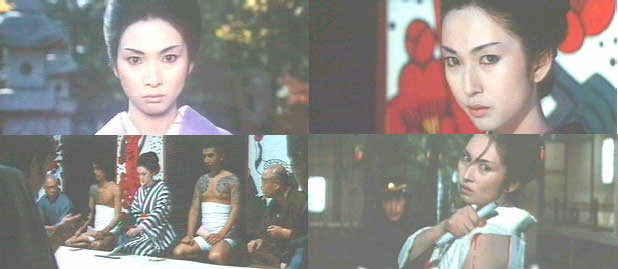Beautiful Blood on Your
Lip
Successors to GWG

Unbound
“I will do it by myself”
(Aya Nakamura, “Wild Criminal”)
What emerges from this eclectic blend of HK
action dramas from various sub-genres, Japanese yakuza films, and Korean
commentaries on anger, retaliation and escape from personal injustice is
a common element of the importance of autonomous action. Whatever
their motives, in order to realize their goals the female protagonists
of these films must step outside the constraints of current convention
and the law. Not one of these female characters finds satisfaction
or solutions within conventional relationship prescriptions for partners
or authority. This invites identification of a subtext involving
the ideology of power, gender and relationships.
 Narrative currents of atypical attraction, retaliation
and alienation are discernible in the three groups of female action dramas
brought together for this review, and they perhaps resonate with larger
themes in the three respective entertainment cultures. Such topics
were not identified in advance or used to screen potential titles, but
simply emerge from repeated viewings. Each collection of films, it
seems, might be regarded as relatively oppositional – albeit oblique –
statements about cultural norms of relationships (HK), obligation (Japan)
and emancipation (Korea) – respectively.
Narrative currents of atypical attraction, retaliation
and alienation are discernible in the three groups of female action dramas
brought together for this review, and they perhaps resonate with larger
themes in the three respective entertainment cultures. Such topics
were not identified in advance or used to screen potential titles, but
simply emerge from repeated viewings. Each collection of films, it
seems, might be regarded as relatively oppositional – albeit oblique –
statements about cultural norms of relationships (HK), obligation (Japan)
and emancipation (Korea) – respectively.
 Thirty years ago, “Yuki” (“Lady Snowblood”) was
enjoined, “Forget joy, forget sorrow, forget love, and forget hate . .
. except for vengeance.” To this we might now add the supplementary
caveat, “And then walk away.” The films selected for review exultantly
loosen conventional bonds, then chart the sometimes-startling course of
individuals suddenly unbound.
Thirty years ago, “Yuki” (“Lady Snowblood”) was
enjoined, “Forget joy, forget sorrow, forget love, and forget hate . .
. except for vengeance.” To this we might now add the supplementary
caveat, “And then walk away.” The films selected for review exultantly
loosen conventional bonds, then chart the sometimes-startling course of
individuals suddenly unbound.
 We may, perhaps, describe these films as offering
the Western viewer opportunities for subversive, oppositional readings.
These include parodies of conventional representation by a self-consciously
“trashy” style that questions gender roles, blatantly appropriates the
cinematic “gaze” and hijacks familiar action conventions. These tactics
detach the usual cinematic signifiers of gender role from their ideological
context through physical skill and power. In addition to providing
multiple opportunities to resist ideological constraint, these Asian action
films also raise possibilities of different constructions of identification
and desire in radical departure from traditional assumptions or stereotypes.
We may, perhaps, describe these films as offering
the Western viewer opportunities for subversive, oppositional readings.
These include parodies of conventional representation by a self-consciously
“trashy” style that questions gender roles, blatantly appropriates the
cinematic “gaze” and hijacks familiar action conventions. These tactics
detach the usual cinematic signifiers of gender role from their ideological
context through physical skill and power. In addition to providing
multiple opportunities to resist ideological constraint, these Asian action
films also raise possibilities of different constructions of identification
and desire in radical departure from traditional assumptions or stereotypes.
 Some might question whether such low-genre films
could ever offer valid commentary on issues of power and gender – except
as object lessons. But this ignores the real and compelling differences
between superficially similar narratives. Although “Two Cops 3,”
“Nude Fear” and “H” are all police procedurals, their ultimate messages
and ideological import differ quite widely. When a film text is viewed
primarily as a vehicle for the delivery of messages that either affirm
or challenge dominant, prevailing norms, it becomes necessary to look beyond
the surface construction of genre and more closely at the contingencies
that resolve the narrative – especially at the source of agency and ultimate
beneficiary. In all the films reviewed here, these are traceable
to the female protagonists themselves – whose actions are at the core of
these narratives.
Some might question whether such low-genre films
could ever offer valid commentary on issues of power and gender – except
as object lessons. But this ignores the real and compelling differences
between superficially similar narratives. Although “Two Cops 3,”
“Nude Fear” and “H” are all police procedurals, their ultimate messages
and ideological import differ quite widely. When a film text is viewed
primarily as a vehicle for the delivery of messages that either affirm
or challenge dominant, prevailing norms, it becomes necessary to look beyond
the surface construction of genre and more closely at the contingencies
that resolve the narrative – especially at the source of agency and ultimate
beneficiary. In all the films reviewed here, these are traceable
to the female protagonists themselves – whose actions are at the core of
these narratives.






